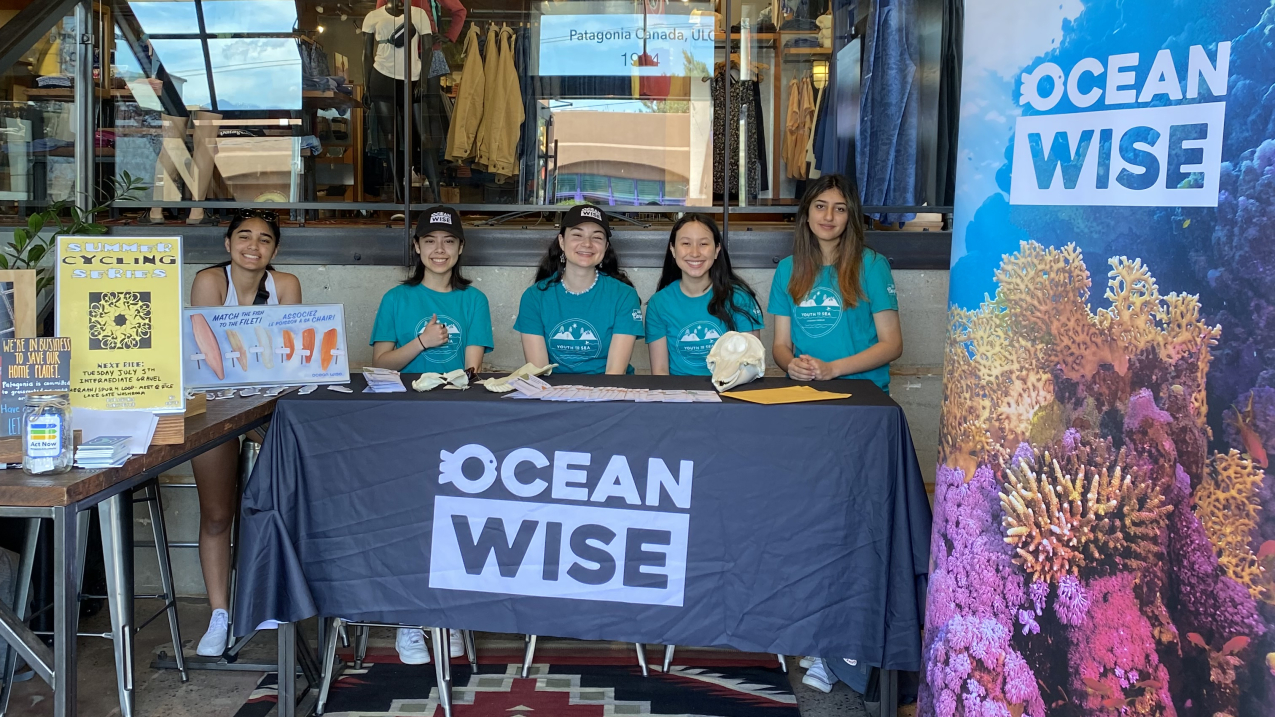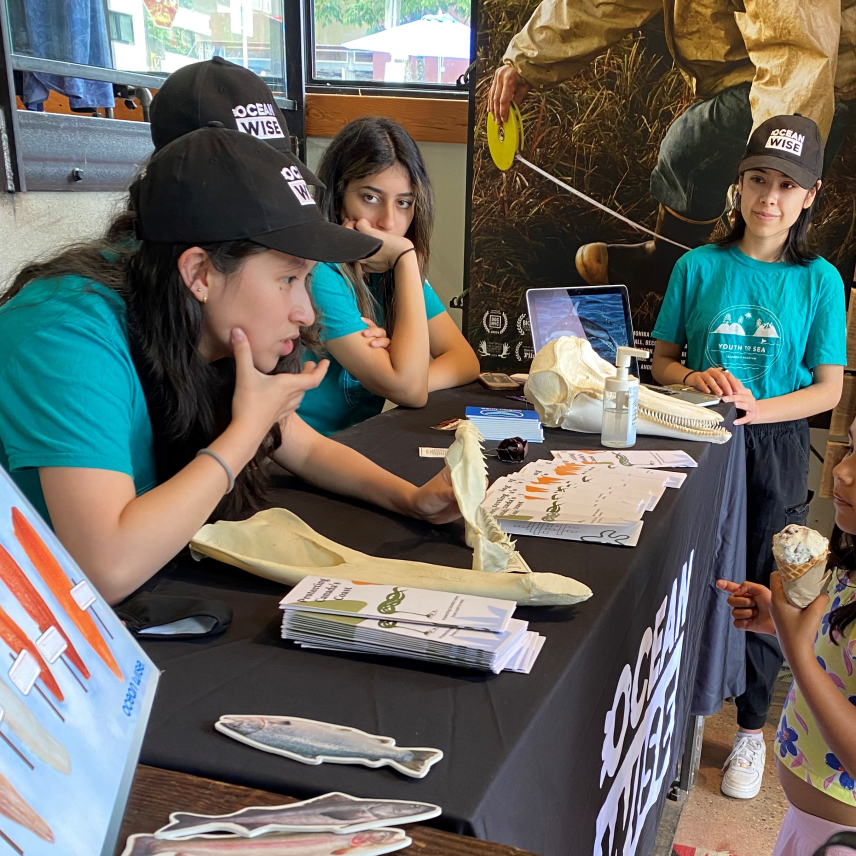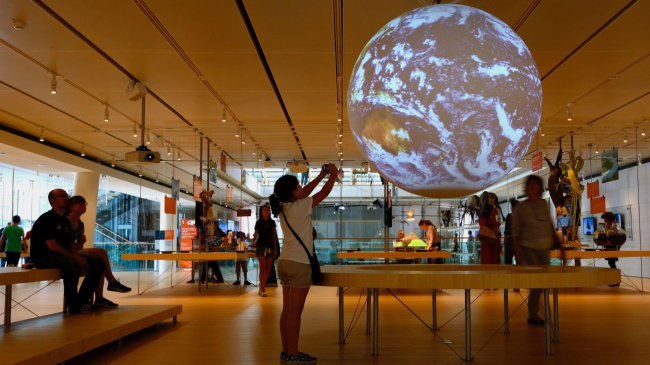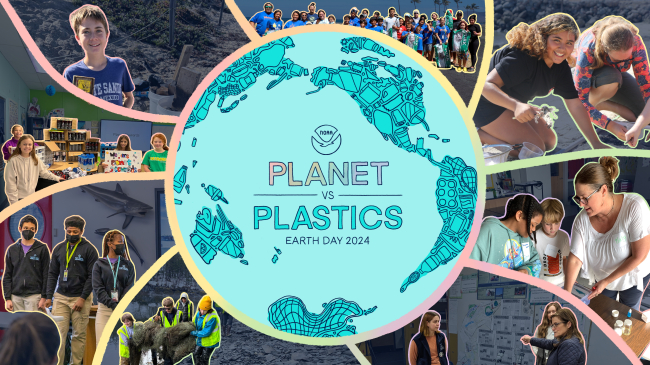Located in the coastal city of Vancouver, Canada, Ocean Wise offsite link aims to connect their visitors to the ocean and see the important resources it provides in their daily lives. This institution is one of 25 aquariums and marine science education centers across North America that make up the Coastal Ecosystem Learning Centers (CELC) network. Together this network engages the public in protecting coast and marine ecosystems and work on shared priorities, such as youth engagement.

Teens from Ocean Wise’s YouthToSea program host a table at a local Patagonia shop in Vancouver, Canada to raise public awareness on Marine Protected Areas. (Image credit: Ocean Wise)
The network worked with a team of high school aquarium volunteers to plan the 2021 CELC Virtual Youth Summit, which brought together more than 60 aquarium high school volunteers from the CELC network to hear from speakers on how to make a difference for the ocean through art, writing, advocacy, and more.
A group of teens from Ocean Wise’s YouthToSea program offsite link, which is a 10-month hands-on-service learning program for high school aged students from Vancouver and its surrounding cities, attended the summit and received funding from NOAA and the North American Association for Environmental Education offsite link to take what they learned to design and lead an action project in their local community. The team led a campaign to promote and raise awareness on the establishment of Marine Protected Areas. We asked the teens to reflect on their project and what they learned through their experiences. Read what they shared below!
Tell us the story of your project!
Our team at Ocean Wise YouthToSea decided to create a strong campaign towards expediting the process of establishing Marine Protected Areas (MPAs) in Canada. Our campaign, called Protecting Canada’s Coasts (PCC), aimed to promote the establishment of MPAs through petition writing, education, and community engagement. We chose to focus on the Offshore Pacific Area of Interest — a deep-water ocean area off the coast of British Columbia — specifically because, if established, it would be the largest MPA in Pacific Canada. This would contribute greatly to the Canadian government’s 2025 Marine Conservation Targets offsite link of establishing MPAs to cover 25% of ocean territory by 2025 and 30% by 2030.
One of the main pillars of our campaign included a government petition calling for the Offshore Pacific Area of Interest to be established as an official Oceans Act offsite link MPA. We also created physical and digital resources to educate others about MPAs and their importance, and did outreach in our community, including hosting a table at Patagonia Vancouver on July 2, 2022. There was no specific audience for our project because we wanted this information to reach as many people as possible; however, the materials that we created were better suited for youth and adult audiences. We plan to continue this campaign in the future and shape it to also act as a catalyst to mobilize and engage youth in the Lower Mainland of British Columbia on climate policy, civic engagement, and community outreach.

What went well in the project, and what did not go according to plan?
A major component of our project was creating and publishing a government petition on Our Commons, which is a web page on Canada's House of Commons offsite link for anyone to search and create petitions. We chose to use a government petition over other petition services because once the 500-signature quota is met, the government would be legally required to respond to our petition’s requests. One requirement, however, of all Our Commons petitions is that they are sponsored by a Member of Parliament (M.P.). Getting a response from MPs quickly became our biggest challenge. In the future, we plan to send handwritten letters since constituency offices receive a large volume of emails daily.
Another challenge was finding a time to meet that worked for everyone, which proved to be difficult due to school and the plethora of other commitments everyone had. To compensate, we selected one meeting time that worked for the majority of us, and provided meeting minutes to those who were unable to make it. We also tried to switch the meeting times when possible so the same people were not missing each meeting.
On the other hand, writing our petition was a success. We took a few months to research specifically why the Offshore Pacific Area of Interest was a good candidate to become an MPA, and we drafted a formal petition that clearly laid out our requests to the government. We spent at least two months reading numerous scientific papers about the importance of the geological features that were unique to this area — namely the hydrothermal vents and seamounts — and we learned that the hydrothermal vents host some of the highest microbial diversity levels in the world.
In summary, we managed to break down a number of complex documents and papers and create a petition that made it easy for readers to understand our goal, and clearly laid out our requests to the government. In addition to the petition, we also created brochures that we plan to hand out to members of our community to promote our campaign. These brochures included information about MPAs, the Offshore Pacific Area of Interest, and a crossword that tested readers knowledge on the information in our brochure.
This was truly an insightful experience for all of us because we were able to learn more about the policies currently protecting our coasts, and how we can mobilize our community to improve ocean conservation in Canada.
How did the project impact you?
It was apparent that the issue of the lack of MPAs was one not on the radar of many – including ourselves. Going into this project, our group knew nothing about these critical establishments, and to us, this unawareness spoke volumes to the lack of education surrounding marine policy, and cemented MPAs as our area of focus for our post-summit project. Through this project, we had the opportunity to dive headfirst into the complex world of marine law and MPAs in Canada. This was truly an insightful experience for all of us because we were able to learn more about the policies currently protecting our coasts, and how we can mobilize our community to improve ocean conservation in Canada.
The major area in which we all grew was in our ability to be self-motivated and developing a strong work ethic. This project entailed a large volume of research to be done on our part, so this forced us to learn how to manage our time, stay on top of our work, and be efficient in completing our tasks. In addition, the hiccups in our project taught us the importance of being adaptable. When we did not hear back from MPs that we reached out to, this prompted us to switch tactics and focus more on outreach, and to assess our strategy in reaching out to MPs.



